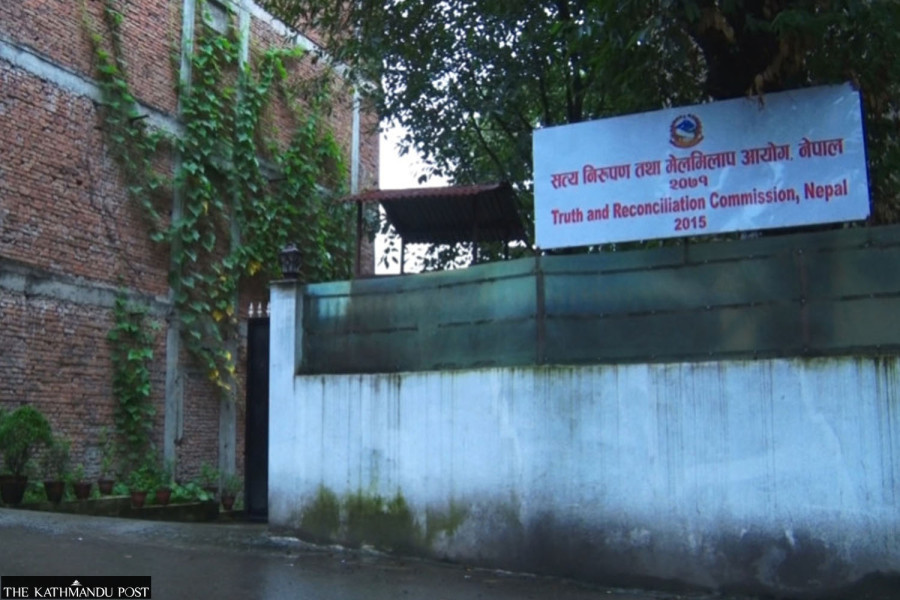National
Transitional justice complaints soar but victims sceptical
Over 78,000 complaints filed, but survivors still wary of the two commissions’ ability to deliver justice.
Binod Ghimire
At the end of the three-month deadline to lodge cases, the volume of complaints related to the insurgency-era atrocities have increased by around a fourth.
With 63,718 complaints pending, the Truth and Reconciliation Commission has received 15,157 new cases, taking the final tally to 78,875. The Commission of Investigation on Enforced Disappeared Persons, on the other hand, has received 97 additional complaints.
The disappearance commission had a total of 3,288 complaints. After preliminary study, the commission said 2,508 fall under its jurisdiction for investigation. With the addition of 97 complaints, the tally has gone up to 2,605.
“Our expectation was around 10,000. But we received 50 percent more complaints,” said Tika Dahal, a member of the truth commission. “Of the total complaints, 3,877 are conflict-related sexual violence cases.”
The two commissions, rejected by a section of the victims from the 1996-2006 era insurgency, had on May 18 solicited complaints from the survivors who could not file cases in the past for various reasons.
The Enforced Disappearances Enquiry, Truth and Reconciliation Commission Act, amended in August last year, provided three more months for the victims, who could not register their complaints in the past, to lodge their cases. If the claims of those involved in the legislation are anything to go by, the provision was introduced targeting the victims of rape and other sexual violence.
Only 314 of 63,718 complaints lodged in the past were related to rape and other sexual violence as most victims were not confident about the privacy and confidentiality in handling of their cases. “The encouraging numbers of new complaints suggest victims’ increasing trust in us. It is evident that the call to boycott the commissions had no impact,” said Dhakal.
The victims, mainly survivors of rape and other sexual violence who have filed the complaints, do not fully agree with Dhakal.
Devi Khadka, coordinator of the National Association of Conflict Rape Victims, a network of conflict-related sexual violence victims, said they filed the complaints with conditions attached. “It’s not that we fully trust the commissions. It’s just that we didn’t want to miss the deadline,” she said. “We will not cooperate with the investigation if our concerns are not addressed.”
Apology from the commission’s leadership for calling the applications by ignoring the sensitivity of the matter, preparation of separate working procedures to look after the cases of sexual violence and rape, setting up separate units to deal with such cases and ensuring at least two victims’ representives in such units are the conditions put forth by the association.
Those who have long followed the transitional justice process say receiving complaints is not enough. “The commissions cannot take the process to a conclusion without accommodating dissident voices. Hundreds of victims are in legal fight against the commissions, and they cannot be ignored,” said Ganesh Datta Bhatta, former chairperson of the truth commission. “From experience, I can say that the government is still reluctant to provide the support necessary for the commissions’ success.”
Observers say three months after assuming the office, the teams from both the commissions seem lost. The commissions have four years starting from March, when their current leadership took office. “Four years is a very short time for the commissions to deal with overwhelming numbers of complaints. But they have yet to take the right path,” said Sadhuram Sapkota, former government joint secretary who played a vital role in preparing the initial draft of the transitional justice bill. “I don’t see any hope.”
Officials at the commissions, however, say they are busy with the preparatory work to begin truth seeking and probing.
Dhakal said the commissions have already finalised organisation and management survey and staff recruitment will begin once the staff quota is endorsed. “We are planning to deploy our teams for truth seeking after Dashain [festival in October]. We have a comprehensive plan to finish our job within the deadline.”
First formed in 2015, the commissions have already been constituted three times. Other than receiving complaints, they have not been able to make any progress in delivering justice to the thousands of insurgency-era victims.




 11.12°C Kathmandu
11.12°C Kathmandu














